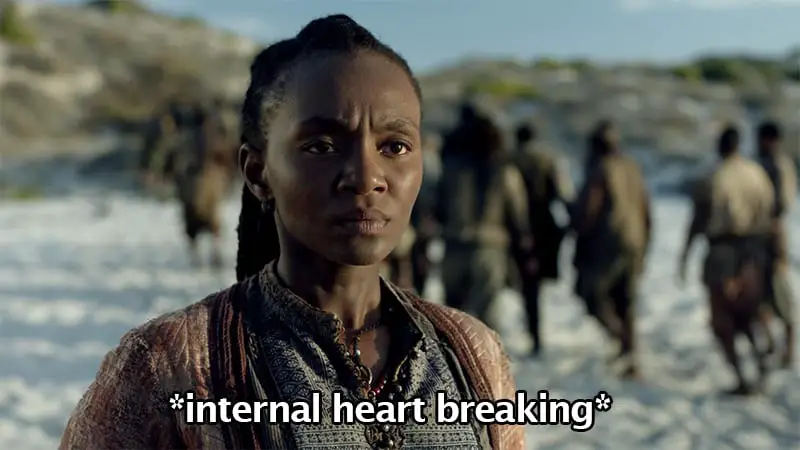You hear a lot about The Dutiful Princess here on the Fandomentals. We are (as far as I know in any case) the first people to crystallize the idea into a trope, and has it ever been exciting to find her everywhere in our favourite media, always in charge and emotionally repressed in equal measure.
The Dutiful Princess is a character, though not always a female character, who wields actual power, or at the very least, is the holder of some kind of gravitas that causes people to Take Her Seriously™. She’s a princess because this power is almost always inherited or unasked for in some way. And while a Dutiful Princess might fight to protect her power, she’s not power hungry or ambitious, at least not in the traditional way. She protects the power she was born to because it’s a fundamental part of her self-identity. There’s no place where the woman (usually) ends and the princess begins, after all.
A consequence of this is that there is nothing more important to a Dutiful Princess than her job. Nothing and no one. If you fall in love with a Dutiful Princess, be prepared to always come second. Because she will never choose you.
This was recently brought home to me while (finally) watching the final season of Black Sails. A good part of the protagonist John Silver’s arc centres around his choice “between a war and a wife”. In his case, the entire series turns on the fact that he chose his wife. But unfortunately for him, his wife is Madi, possibly the most consistently written Dutiful Princess I have yet come across in any work. When she was, very literally, given the chance to have domestic bliss forever with the man she loves in exchange for a negotiated peace, well… she chose the war.
[…]this war, their war, Flint’s war, my war. It will not be bargained away to avoid a fight, to save John Silver’s life, or his men’s, or mine.
Ouch. I told you a Dutiful Princess would never put you first. But here’s the thing: it’s not because she doesn’t love him, and it’s certainly not because her heart wouldn’t be broken into a billion pieces if she was taken at her word John life was the price to pay to continue the war. It’s just that she decided that her broken heart isn’t particularly important.

The heart of the conflict within the character of the Dutiful Princess is that they do have feelings for things other than their job, very strong feelings, in fact, but they also think that feelings are dumb, and that the fact they have them proves that they’re the worst and they need to double down on their commitment to their job. This low opinion of themselves also means that, at least subconsciously, our princess doesn’t feel that she deserves the happiness that a successful romantic relationship might give her, particularly if it has to be paid for elsewhere.
In Madi and John’s case, the circumstances ended up allowing them to be together in the end, but that seems to be the exception rather than the rule for the Dutiful Princess. The OG Dutiful Princess, Arianne Martell, chose her duty over the love of her life when she was fourteen, and spent the next decade telling herself she was totally cool with it, even though she clearly was not and even though the fact that they’re still grossly in love was rather obvious.
Even very established relationships are helpless before the Dutiful Princess’s near biological need to fulfill the expectations that they’ve set for themselves. Tenzin from The Legend of Korra may claim that his relationship to Lin Beifong ended because they’ve “been growing apart for some time,” but, since he’s such a Dutiful Princess, it’s sometimes a little hard to believe him. That being said, it’s also quite hard to argue that his feelings for Lin were anything but very serious; they were together for about fifteen years after. But there are no feelings in the world that could have survived Tenzin’s need to make air babies, and also no way he would ever admit that air babies are not the only thing he ever wanted. (Not that he doesn’t like Pema… it’s complicated, okay?)

The thing is, another way to frame the Dutiful Princess always choosing her job over her relationship is that she always chooses power over those she supposed to love. But, the Dutiful Princess is also always a sympathetic character since this choice is made for “good” reason…out of duty, if you will. In a way, this makes the Dutiful Princess a rather transgressive character, because there’s another kind of overwhelmingly female character who always chooses power over love. She’s that terrible, power-hungry Evil Queen or Stepmother, who’s willing to railroad everyone just to stay in control.
The gendered implications of this juxtaposition are obvious, and very interesting. There is always that implication that the Evil Queen is evil because she doesn’t live up to the feminine ideal of nurturing and all-sacrificing motherhood. They intrude on a male sphere and their failure to maintain the patriarchal order is often the root cause of conflict in the narrative. A Dutiful Princess, in many ways, makes the same choice. The difference between a hunger for power and a need to do your duty can often be more about who the hero of the story is than a given character’s actual actions. The Dutiful Princess’s decisions can also lead to conflict and harm after all, not only to the poor object of her affections—the one she’s usually willing to let die for the cause—but also to herself. This inherently gendered conflict is a fundamental part of the character; she wants the female-coded “normal, happy life” with the same intensity that she needs male coded authority and power. (This is also why male Dutiful Princesses like Tenzin are so gosh darn interesting, but that might be another piece.)
There are few fates more unfortunate in the romantic sphere than falling in love with a Dutiful Princess, but you can only hope that it’s a comfort to know that she feels really bad about it, and it’s all for a good cause.

